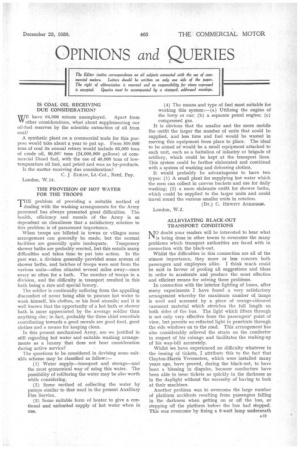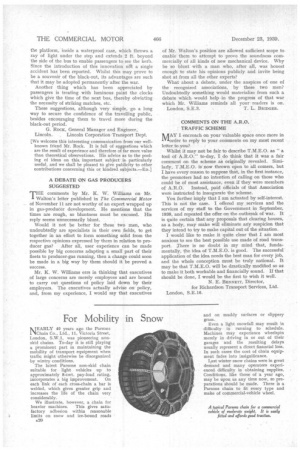OPINIONS and O UERIES
Page 21

Page 22

If you've noticed an error in this article please click here to report it so we can fix it.
IS COAL OIL RECEIVING DUE CONSIDERATION?
WE have 64,000 miners unemployed. Apart from VV other considerations, what about supplementing our oil-fuel reserves by the scientific extraction of oil from coal?
A synthetic plant on a commercial 'scale for this purpose would take about a year to put up. From 500,000 tons of coal its annual return would include 60,000 tons of crude oil, 80,000 tons (24,000,000 gallons) of commercial Diesel fuel, with the use of 40,000 tons of lowtemperature oil fuel, and petrol and wax as by-products.
Is the matter receiving due consideration?
C. J ELNAN, Lt.-Col., Retd. Pay. London, W.14, THE PROVISION OF HOT WATER FOR THE TROOPS
T"problem of providing a suitable method of dealing with the washing arrangements for the Army personnel has always presented great difficulties. The health, efficiency and morale of the Army is so dependent on cleanliness that a satisfactory solution to this problem is of paramount importance.
When troops are billeted in towns or villages some arrangement can generally be made, but the normal facilities are generally quite inadequate. Temporary shower baths are probably erected, but this entails many difficulties and takes time to put into action. In the past war, a division generally provided some system of shower baths, and batches of troops were sent from the various units—often situated several miles away—once every so often for a bath. The number of troops in a division, and the difficulty in transport resulted in this bath being a rare and special luxury.
The soldier is continually suffering from the appalling discomfort of never being able to procure hot water to wash himself, his clothes, or his food utensils; and it is well known that the opportunity of a hot bath or shower bath is more appreciated by the average soldier than anything else; in fact, probably the three chief essentials contributing towards a good morale are good food, good clothes and a means for keeping clean.
In this present mechanized Army, are we justified in still regarding hot water and suitable washing arrangements as a luxury that does not bear consideration during active service?
The questions to be considered in devising some suitable scheme may be classified as follow:—
(1) Water supply—transport and storage and the most economical way of using this water. The possibility of refdtering the water may be also worth while considering.
(2) Some method of collecting the water by pumps similar to that used in the present Auxiliary Fire Service.
(3) Some suitable form of heater to give a continual and unlimited supply of hot water when in use. (4) The means and type of fuel most suitable for working this system:—(a) Utilizing the engine of the lorry or car; (b) a separate petrol engine; (c) compressed gas.
It is obvious that the smaller and the more mobile the outfit the larger the number of units that could be supplied, and less time and fuel would be wasted in moving this equipment from place to place. The ideal to be aimed at would be a small equipment attached to each unit, such as a battalion of infantry or brigade of artillery, which could be kept at the transport lines. This system could be further elaborated and combined with a system of washing and delousing clothes.
It wbuld probably be advantageous to have two types: (1) A small plant for supplying hot water which the men can collect in canvas buckets and use for daily washing; (2) a More elaborate outfit for shower baths, which could be supplied to the larger units and could travel round the various smaller units in rotation.
(Dr.) C. HEWITT ATKINSON. London, W.2.
ALLEVIATING BLACK-OUT TRANSPORT CONDITIONS
MO doubt your readers will be interested to hear what I 11 is being done in other towns to overcome the many problems which transport authorities are faced with in connection with the black-out.
Whilst the difficulties in this connection are all of the utmost importance, they more or less concern both passengers and employees alike. I think much could be said in favour of pooling all suggestions and ideas in order to accelerate and produce the most effective and efficient means for solving these problems.
In connection with the interior lighting of buses, after many. experiments I have found a very satisfactory arrangement whereby the maximum number of lamps is used and screened by a piece of orange-cOloured casement material which stretches the full length on both sides of the bus. The light which filters through is not only very effective from the passengers' point of view, but permits no reflected light to penetrate through the side windows on to the road. This arrangement has also considerably relieved the strain on the conductor in respect of his coinage and facilitates the making-up of his way-bill accurately.
Whilst we have experienced no difficulty whatever in the issuing of tickets, I attribute this to the fact that Clayton-Harris Verometers, which were installed many years ago, have proved, during the black-out, to have been a blessing in disguise, because conductors have been able to issue tickets as quickly in the darkness as in the daylight without the necessity of having to look at their machines.
Another problem was to overcome the large number of platform accidents resulting from passengers falling in the darkness when getting on or off the bus, or stepping. off the platform before the bus had stopped. This was overcome by fixing a 6-watt lamp underneath
the platform, inside a waterproof case, which throws a ray of light under the step and extends 2 ft. beyond the side of the bus to enable passengers to see the kerb. Since the introduction of this innovation not a single accident has been reported. Whilst this may prove to be a souvenir of the black-out, its advantages are such that it may be adopted permanently after the war.
Another thing which has been appreciated by passengers is treating with luminous paint tha clocks which give the time of the next bus, thereby obviating the necessity of striking matches, etc.
These suggestions, although very simple, go a long way to secure the confidence of the travelling public, besides encouraging them to travel more during the black-out period.
G. Rocx, General Manager and Engineer, Lincoln. , Lincoln Corporation Transport Dept.
[We welcome this interesting communication from our wellknown friend Mr. Rock. It is full of suggestions which are the result of experience and therefore of far more value than theoretical observations. His advice as to the pooling of ideas on this, important subject is. particularly useful, and we shall be pleased to give publicity to other contributions concerning this or kindred subjects.—ED.]
A DEBATE ON GAS PRODUCERS SUGGESTED
THE comments by Mr. K. W. Williams on Mr. I Walton's letter published in The Commercial Motor of November 11 are not worthy of an expert wrapped up in gas-producer development. He mentions that the times are rough, so bluntness must be excused. His reply seems unnecessarily blunt.
Would it not be better for these two men, who undoubtedly are specialists in their own fields, to get together in an effort to form something solid from the respective opinions expressed by them in relation to producer gas? After all, user experience can be made possible by big concerns adapting a small part of their fleets to producer-gas running, then a change could soon be made in a big way by them should it be proved a success.
Mr. K. W. Williams errs in thinking that executives of large concerns are merely employees and are bound to carry out questions of policy laid down by their employers. The executives actually advise on policy, and, from my experience, I would say that executives
of Mr. Walton's position are allowed sufficient scope to enable them to attempt to prove the soundness commercially of all kinds of new mechanical device. Why be so blunt with a man who, after all, was honest enough to state his opinions publicly and invite being shot at from all the other experts?
What about a debate, under the auspices of one of the recognized associations, by these two men? Undoubtedly something would materialize from such a debate which would help in the progress of that war which Mr. Williams reminds all your readers is on.
London, S.E.3. T. L. BRIDGER.
COMMENTS ON THE A.R.O. TRAFFIC SCHEME
TII1AY I encroach on your valuable space once more in rder to reply to your comments on my most recent letter -to you?
Whilst it may not be fair to describe T.M.E.O. as " a tool of A.R.O." to-day, I do think that it was a fair comment on the scheme as originally revealed. Similarly, T.M.E.O. is now thrown open to all corners, but I have every reason to suppose that, in the first instance, the promoters had no intention of calling on those who could be of most assistance, even if they were members
of A.R.O. Instead, paid officials of that Association were instructed to inaugurate the scheme.
You further imply that I am actuated by self-interest. • This is not the case. I offered my services and the services of my staff to the Government in September, 1938, and repeated the offer on the outbreak of war. It is quite certain that any proposals that clearing houses, as a body, may make will eliminate any suspicion that they intend to try to make capital out of the situation.
I would like to make it quite clear that I am most anxious to see the best possible use made of road transport. There is no doubt in my mind that, fundamentally, the idea of T.M.E.O. is good. The successful application of the idea needs the best man for every job, and the whole conception must be truly national. It may be that T.M.E.O. will be drastically modified so as to make it both workable and financially sound. If that should be done, I would be the first to wish it well.
N. E. BENNETT, Director, for Richardson Transport Services, Ltd.
London, S.E.16.




















































